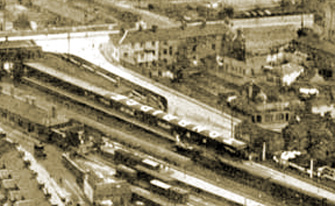

No-one is sure how Tonbridge got its name. Place-name experts tend to favour ‘tun’ meaning a manor or farm in Old English, combined with ‘brycg’, an early form of ‘bridge’.
Others doubt if the second half really means ‘bridge’ at all, since the first recorded use of the name occurred more than a century before the first mention of the existence of any actual bridge. However it seems the word ‘bridge’ could sometimes mean a causeway or raised track across marshland, and something of that sort may have existed here since early times to help people cross the five streams and the flood plain. So Tonbridge could be the manor with the causeway.
Alternative suggestions are that the bridge was built or managed by a man called Tunna – apparently a common Anglo-Saxon name, or that the river upstream from Tonbridge was once called the ‘Tone’. Neve in 1933 favoured a combination of ‘tun’ meaning town and ‘burig’ meaning fort: the town with a fort.

Two names for the same place appear on this pre-1818 print label.
For a long time, spelling didn’t matter, with numerous different versions appearing in written records over the years, including Tonebrige, Tonebricge, Tunbryega, and Tonebrugga. Tunbridge seems to have been the more common usage in the 17th century, particularly when referring to the fashionable new watering-hole a few miles to the south. To distinguish the two places, the terms Tunbridge-Town and Tunbridge-Wells (or Tonbridge-Town and Tonbridge-Wells) were widely adopted.

The town's name was once boldly displayed on the station roof, for the benefit of passing aviators.
By 1839 Pigot’s Directory was opting firmly for Tonbridge (and Tonbridge Wells) with an 'o', declaring the ‘u’ spelling to be ‘erroneous’, but it was many years before there was universal agreement. Not until the 1890s did the Tonbridge Local Board formally adopt the ‘o’ spelling, though it was 1929 before the Southern Railway was finally persuaded to call the station 'Tonbridge'. Tunbridge Wells, meanwhile, retained the 'u', the different spellings helping to emphasise to outsiders that there are two different places.
Whatever the spelling, the first syllable always rhymes with 'sun’.